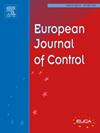针对具有多重攻击的随机三阶 PDE 系统的依赖观测器的事件触发安全控制设计
IF 2.5
3区 计算机科学
Q2 AUTOMATION & CONTROL SYSTEMS
引用次数: 0
摘要
本文章由计算机程序翻译,如有差异,请以英文原文为准。
Observer-reliant event-triggered security control design for stochastic third-order PDE systems with multiple attacks
This study accentuates the issues of state estimation and event-triggered security control design for stochastic third-order parabolic partial differential equation systems subject to nonlinearity, external disturbances, and multiple cyber attacks. Considering the unavailability of system states, a Luenberger-type state observer is implemented to acquire the approximations of actual system states for effectively addressing the problem of state unavailability. With the primary intent of utilizing network resources efficiently, we design an event-triggered controller for third-order PDE systems to effectively reduce the data transmission of the communication channel. Additionally, deception and denial-of-service attacks are assumed to occur in the communication network, which is governed by two independent sequences of Bernoulli-distributed random variables, each with its own probability. Furthermore, the dissipative performance is utilized to mitigate the effects of external disturbances. Thereafter, by constructing an appropriate Lyapunov–Krasovskii functional, a set of suitable criteria is derived within the framework of linear matrix inequalities to guarantee the mean-square exponential stability and dissipativity of the considered system. Further, a precise layout for the intended controller and observer gain matrices is established by employing the postulated criteria. At the end, two numerical examples are provided to demonstrate the effectiveness and relevance of the established theoretical findings.
求助全文
通过发布文献求助,成功后即可免费获取论文全文。
去求助
来源期刊

European Journal of Control
工程技术-自动化与控制系统
CiteScore
5.80
自引率
5.90%
发文量
131
审稿时长
1 months
期刊介绍:
The European Control Association (EUCA) has among its objectives to promote the development of the discipline. Apart from the European Control Conferences, the European Journal of Control is the Association''s main channel for the dissemination of important contributions in the field.
The aim of the Journal is to publish high quality papers on the theory and practice of control and systems engineering.
The scope of the Journal will be wide and cover all aspects of the discipline including methodologies, techniques and applications.
Research in control and systems engineering is necessary to develop new concepts and tools which enhance our understanding and improve our ability to design and implement high performance control systems. Submitted papers should stress the practical motivations and relevance of their results.
The design and implementation of a successful control system requires the use of a range of techniques:
Modelling
Robustness Analysis
Identification
Optimization
Control Law Design
Numerical analysis
Fault Detection, and so on.
 求助内容:
求助内容: 应助结果提醒方式:
应助结果提醒方式:


